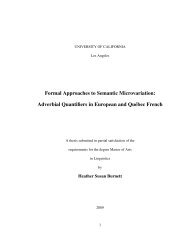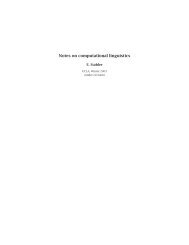A Grammar of Miya - UCLA Department of Linguistics
A Grammar of Miya - UCLA Department of Linguistics
A Grammar of Miya - UCLA Department of Linguistics
You also want an ePaper? Increase the reach of your titles
YUMPU automatically turns print PDFs into web optimized ePapers that Google loves.
230 A <strong>Grammar</strong> <strong>of</strong> <strong>Miya</strong><br />
(65a), gwalfa 'chieftainship', but not ngan 'name', has been previously mentioned, and the<br />
kif here cannot be a topic marker since the phrase is actually afocused subject, as shown by<br />
thejiy (S:§2.2.4, 12:§2.2.1), hence kif must apply only to N 2 . In (65b, c), neither syntax.<br />
nor pragmatics reveal the scope <strong>of</strong> kif: in (65b) kif cannot be a modifier <strong>of</strong> only N2 since it<br />
is a personal pronoun and is thus inherently definite and referential, but here kif seems to be<br />
a topic marker and probably therefore takes the entire NP, not just N 1> into its scope; in<br />
(65c), both Nt jif" 'husband' (in the context, not actually "husband", but rather the man to<br />
whom another man's wife has gone to live with) and N2 'am 'woman' are definite.<br />
Because kif is adjacent to the latter, intuitively it would seem to be this N to which it<br />
applies. I know <strong>of</strong> no way to prove, given present data, that it does not apply to Nt or to<br />
the whole phrase, but I have found no examples parallel to (65a) where kif could apply to<br />
Nt only.<br />
4.1.2. Relative clauses as determiners. In contrast to other Chadic languages,<br />
including Rausa, noun phrases containing relative clauses usually do not contain other<br />
determiners. The presence <strong>of</strong> a relative clause does not preclude other determiners, as the<br />
NP initial nlfka in (66) shows, and a common way to introduce new elements into a<br />
narrative is to use a presentative sentence with a noun modified by an indefinite determiner<br />
and an extraposed relative clause, as in (67):<br />
(66) too naka tal ba na d-aa biy 'ara ka, t-aa 'area) ee-wutay 'onaa niya zok-uwso<br />
'well, that beer that he will cook, he will cook it in conjunction with his uncles'<br />
(67) wiy war jiyeeyi ba na d-aa aom-uwso<br />
'there is a certain festival that they do' (lit. 'a certain festival there is that they do-it')<br />
Nonetheless, few examples <strong>of</strong> noun phrases containing relative clauses that I collected<br />
through elicitation contain any determiner (see lO:§5.2 for examples). In texts, aside from<br />
a small number <strong>of</strong> examples like that in (66) with a demonstrative, most cases <strong>of</strong><br />
determiners in NP's containing relative clauses fall into two classes: those with an<br />
indefinite determiner as in sentences <strong>of</strong> the type in (67) and topicalized NP's ending in kif.<br />
As it happens, NP's containing relative clauses are <strong>of</strong>ten placed sentence initial as topics<br />
(cf. (66)), which gives the impression that NP's containing relative clauses tend also to<br />
have a previous reference marker. However, non-topicalized NP's with relative clauses<br />
rarely have a determiner <strong>of</strong> any kind:<br />
(68) do baa-za aakan hajifa baa nja d-aalu-was"<br />
'she goes to the house <strong>of</strong> the man whom she loves! -him)'<br />
(69) miy aa zaa baa d" faara buwahiy-uws"<br />
'we will install [as chief] the one who was first to come'<br />
4.1.3. Numerals as determiners. There is a tendency for at least indefinite<br />
determiners (§ 1) not to co-occur with numerals used as nominal attributives:<br />
9. Reference, Definiteness, Universality, and Reflexivity! §4)<br />
(70) a. Farkoo taariyhiy na <strong>Miya</strong>, s_ba tsar do faara buwahiya-t1gn.<br />
'The beginning <strong>of</strong> the history <strong>of</strong> <strong>Miya</strong>, two men were the first to come.'<br />
b. Waatoo san wuta do faara buwahiy-uwso do tsgg-uwso aaMangiia.<br />
'That is, one man was the first to come, and he settled at Mangila.'<br />
(71) a. bazaniy wuta njo g-aa paa dzafo har vaatlo<br />
'one!a girl (she) may collect as many as five men [as suitors],<br />
b. wiya 'am, kaafin miya-za, nj-aa bna dzafo vaatl"<br />
'a woman, before her death, she may marry five husbands'<br />
The sentences in (70) come from the beginnings <strong>of</strong> narrative histories and are the first<br />
mentions <strong>of</strong> the referents. In a number <strong>of</strong> other narratives, the first mention <strong>of</strong> new<br />
characters uses the indefinite determiners. The sentences in (71) have NP's in almost<br />
identical contexts, one uses the numeral wuta 'one', the other the definite determiner wiya.<br />
I doubt, on the basis <strong>of</strong> data from other Chadic languages, that co-occurrence <strong>of</strong><br />
numerals and indefinite determiners results in ungrammaticality, but I have no examples<br />
from texts or elicited data <strong>of</strong> the type (?)niywiy sab" ts_r 'a certain two men' (cf. the<br />
grammatical Hausa phrase wadansu mutane biyu). I do have examples <strong>of</strong> demonstratives<br />
and numerals co-occurring, e.g. niykin cuw dar8itim 'these ten goats' .<br />
4.2. Generic nouns. Nouns used in a generic sense have no determiners:<br />
(72) Generic Subject<br />
a. kwaa zaa vuw aa aa 'am ka, wiy hanjiyeeyi ham ba na d-aa cfgrnaw<br />
'when a woman becomes pregnant, there is a thing that is done'<br />
(see fn. 14 for ordering <strong>of</strong> subject in the first clause)<br />
b. kwaa mba-uwsg washasham ka, ...<br />
'if the rainy season ["the" in generic sense] is good, ... '<br />
c. aa 'iyka saba d-aa daaa buwahiya-t1on<br />
'thereupon people came in great numbers [to settle at <strong>Miya</strong>]'<br />
(73) Generic Object<br />
a. do baa-zeal ee kuwa aabiy<br />
b. ee doona tliwiy n-aatsakan<br />
c. do tokona-ya gaangan<br />
d. nj-aa kona dlarkiy<br />
'she went to draw water'<br />
'to hunt wild animals [animal <strong>of</strong>-bush],<br />
'they beat drums [drum] for him'<br />
'she buys a chicken'<br />
e. mukwa na d-aa biyu saa tal ka, a tsaa ngan muku taka<br />
'on the day that they will drink beer, they will perform the naming [will give<br />
name] on that day'<br />
231
















